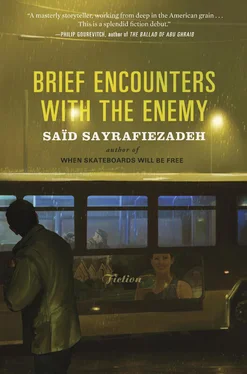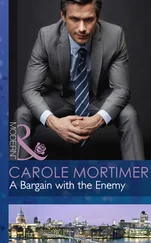I got off at Exit 12 and circled back down and took the bridge. I was speeding, I didn’t care, I was trying to make up for lost time. When I took the turn, Joey Joey had to put his hands on the dashboard. Down below, the river had a nice tint in the evening light, and on both sides of the river were the factories pumping out smoke for the war effort. Twenty-four hours a day, they pumped out smoke.
“I should get a job down there,” Joey Joey said, tapping the window. He sounded wistful.
“You’d be back in a week,” I said, “begging to be an associate again.”
“Maybe, maybe not,” he said. He was looking at the river. He was talking more to himself than me. “Might go ahead and join up,” he said. “Might just do that.”
I’d heard it before. He’d talked about it during the peace and during the buildup. He’d talked about it when the shooting first started. He’d be talking about it when everyone came home. He’d probably be talking about it during the next war. He didn’t have that thing .
“Join up,” he continued, “head over there, see Chip, have an adventure. Blow some people up.” He snickered. “Get in shape.” He pinched his muffin top by way of example. “Maybe, maybe not,” he said.
At the top of the hill I made a left into Winchester Parks and then a right. It was called Winchester Parks but there wasn’t anything green about it anymore. It’d been an Italian neighborhood, it’d been a Jewish neighborhood, now it was up for grabs. Way down at the end of the street, I could see the long row of stores, with Bildman’s shop in the middle. It had a red neon sign that was lit up: BILDMANS SH P. On one side of the shop was a pizza place and on the other was a Chinese store that sold remedies. I slowed down because I was suddenly nervous about seeing Zlottie, suddenly unprepared, suddenly didn’t know what I was doing or why exactly I’d come. “I thought you said you weren’t coming anymore,” she’d say. She’d be confused. I’d be embarrassed.
At the stop sign, I took a long time. Out in front of Mr. Bildman’s shop were boxes filled with little American flags being sold for ninety-nine cents each. The pizza place had a sign saying that if you were a soldier, you could get a slice for half price. “I should tell them I’m a marine,” Joey Joey said.
I pulled over and checked my face in the rearview mirror. I checked my teeth and I checked my email. I leaned over and popped the glove compartment and took out a tin of Altoids. There were five tins of Altoids in the glove compartment. I’d bought them at Walmart. Almost everything I owned I’d bought at Walmart: toothpaste, socks, you name it. Walmart helped keep me alive and I helped keep them in business. I put three Altoids in my mouth.
“Can I have one?” Joey Joey said.
I gave him a whole tin. “Wait here,” I said.
The door jingled when I entered the shop. I was anticipating seeing Zlottie on the ladder, the way she had appeared in my late-night and early-morning fantasies. Instead, I saw her father. He was standing behind the counter with a handful of slips of green paper. His black hat was on the counter and his head was bald. He was wearing his black wash-and-wear suit that he wore every day. His enormous white beard seemed to have grown more enormous since the last time I’d seen him, more cloud than beard. It looked untrimmed and unwashed. The shop looked unwashed. It was small and cramped, about the size of the customer bathroom at Walmart, and it was loaded floor to ceiling with anything you might ever need in life. I’d once seen a boy come in and ask for a can of sardines and a pack of baseball cards, and Mr. Bildman had them bagged and ready to go in under a minute.
At some point we’d swallow this shop whole. I’d be the district manager by then and this would be my district. That would be an example of irony.
Mr. Bildman looked up from his green slips. He didn’t seem particularly happy to see me. I stood in the center of the store holding my boxes of merchandise like one of those trainers who showcases a dog at the tournament. I hoped he liked my boxes.
“Put them in the back,” he said.
I wanted to ask him where his daughter was, because if his daughter wasn’t there, I wasn’t interested. But I went dutifully to the back room. There was a gunmetal desk standing like an island amid towers of more odds and ends. I set the boxes on the desk and sat down in the swivel chair and waited. I was prepared for something to fall on my head. I checked my BlackBerry. Now and then I would hear the door jangle and I would listen for Zlottie’s voice but it was always a customer. Every customer wanted some kind of break. “I’ll pay you the rest next week,” they all said.
I started to wonder if Zlottie had taken off, moved or something, gone to Israel. She’d talked about Israel the way old people I knew talked about Ireland. She’d also talked about going back to school. We’d had heartfelt discussions while I was waiting around for Chip to get his money. She would stand on the opposite side of the counter with the cash register, but it felt close, like the counter was a part of us and we were pressing our bodies against it as we stood staring at each other. She was the only person who ever asked me what my plans were for the future, and I’d tell her about becoming a district manager. “Wow,” she’d say, “that’s exciting, Nick.” It sounded like she was sincere, but who knows. I always made a point of encouraging her to get her degree, because I wanted her to see that I was one of those kind of people who could be optimistic and helpful. Now I regretted it. I should have encouraged her to remain in the shop forever.
Mr. Bildman came into the back office. He didn’t look at the boxes I’d brought, he just said, “I’ll give you sixty for everything.”
It was a generous figure, far more than I’d thought it would be. It made me wonder if Chip had been duplicitous when he’d hand me fifteen bucks on the way home and tell me it was half.
“I’ll take it,” I said.
He had it right there in his pocket. He handed it to me. He wanted me out of the shop as fast as possible, as if he knew what I’d really come for. He was one of those fathers who didn’t want anyone to lay a finger on his daughter. I stood up and he sat down.
“Tell Zlottie I said hi,” I said.
He snapped his head sharply. “What?”
I repeated myself. He nodded. He wasn’t going to tell her a thing.
But as I came out of the back office, there she was, just like that, like a vision, standing on the top rung of the ladder stacking cans of soup. Here was my fantasy come alive. She was wearing the same black skirt with the same black shoes, and her hair was as black as I remembered. She must have thought I was her father, because she said something like “I’m almost done,” and then she accidentally dropped a can of soup. It banged and rolled. I bent down to retrieve it, and when I looked up, she was staring at me with surprise. I could feel my face burn red, and the heat from my face traveled straight down my body.
“What are you doing here, Nick?” she said. She laughed, as if my appearance was comical. This wasn’t what I had fantasized. I stood there staring at her. She hovered above me in the air, five rungs high on the ladder, the shelves of merchandise floating behind her head.
“I missed you, Zlottie,” I said. I wanted it to come out breezy, but it sounded earnest and maybe a little pathetic.
I handed her the can of soup. She reached for it and her skirt rode up an inch past her ankle.
“I missed you too,” she said, but she grinned so broadly that I couldn’t tell whether she was teasing or not.
And then the door tinkled, and I heard someone saying, “Nick, hey. Hey, Nick. About how much longer you think you’re going to be here?” Joey Joey stood in the doorway with a slice of pizza.
Читать дальше












